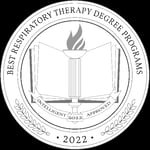The simple act of breathing is not something most people think about - until they can't breathe normally. As a Respiratory Therapist, you will use a combination of scientific standards and practices to discover, manage and prevent dysfunctions of the cardiopulmonary system.
Respiratory Therapists work with medical direction at sites such as wellness centers, medical offices, asthma clinics, sleep disorder centers and in hospitals. The patients you care for will rely on you to help diagnose lung and breathing disorders, determine therapies and implement and manage ongoing care and treatment programs.

According to the Bureau of Labor Statistics, the median salary in May 2024 for a Respiratory Therapist in the U.S. was $80,450 per year ($38.68 per hour), with a much faster than average projected job growth of 12 percent between 2024 and 2034.
.png)


